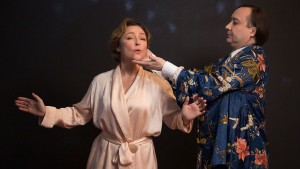By Cleaver Patterson.
At one point, about half way into Marguerite (2015), the drama by French writer/director Xavier Giannoli, singing teacher Atos Pezzini (Michel Fau) is trying, diplomatically, to describe his pupil Marguerite Dumont (Catherine Frot) to some of those who have assembled to hear her latest performance. Where Marguerite is concerned, he explains with appropriate theatricality, “the sublime and the ridiculous are never far apart”. Which could, in fact, be a good description of the film as a whole.
 Taking inspiration from the real-life story of Florence Foster Jenkins – the famed American socialite who thought she could sing, whilst in fact lacking any sense of tone, rhythm or pitch – the story is transposed from 20th century New York to a Paris full of louche bohemians and anarchistic artists. Marguerite, a rich and deluded Parisian with more money than sense, believes she has the voice of an angel. In reality however she posses no form of musicality at all, and whiles away the days in a fantasy world at her country house outside Paris. Here she is photographed as characters from her favourite operas, as well as occasionally performing to select gatherings of loyal friends and trusted acquaintances, who say what Marguerite wants to hear instead of, perhaps, what she should hear – i.e. that she couldn’t sing to save her life. Her husband Georges (André Marcon), embarrassed by his wife’s performances, always manages, in some contrived way or another, to miss them. It’s only when a charity soiree at which she is singing is gatecrashed by music critic Lucien Beaumont (Sylvain Dieuaide) and his idealistic artist friend Krill Von Priest (Aubrey Fenoy), that the trouble really starts. Despite being shocked by her complete inability to hold any kind of note, the two men befriend Marguerite and persuade her to stage a solo concert in Paris, with unforeseen and tragic results.
Taking inspiration from the real-life story of Florence Foster Jenkins – the famed American socialite who thought she could sing, whilst in fact lacking any sense of tone, rhythm or pitch – the story is transposed from 20th century New York to a Paris full of louche bohemians and anarchistic artists. Marguerite, a rich and deluded Parisian with more money than sense, believes she has the voice of an angel. In reality however she posses no form of musicality at all, and whiles away the days in a fantasy world at her country house outside Paris. Here she is photographed as characters from her favourite operas, as well as occasionally performing to select gatherings of loyal friends and trusted acquaintances, who say what Marguerite wants to hear instead of, perhaps, what she should hear – i.e. that she couldn’t sing to save her life. Her husband Georges (André Marcon), embarrassed by his wife’s performances, always manages, in some contrived way or another, to miss them. It’s only when a charity soiree at which she is singing is gatecrashed by music critic Lucien Beaumont (Sylvain Dieuaide) and his idealistic artist friend Krill Von Priest (Aubrey Fenoy), that the trouble really starts. Despite being shocked by her complete inability to hold any kind of note, the two men befriend Marguerite and persuade her to stage a solo concert in Paris, with unforeseen and tragic results.
Marguerite is exquisite in every sense but sound – which is clearly its aim. The juxtaposition of the its visual beauty with its less than appealing bombardment on the ears, plays in the film’s favour, making it a delightfully tragic experience. Like her husband and friends who – despite being driven to despair (or in the case of her husband, to the arms of a mistress) by Marguerite’s total oblivion to the fact that she can’t sing a note – tell her what she wants to hear in order to spare her feelings, the viewer has mixed emotions for the character at the story’s heart.
 Clearly there are inevitable comic elements – when you first hear Marguerite sing the Queen of the Night aria from Mozart’s opera The Magic Flute you can’t help but feel both amusement and pity at the poor woman’s stoic self-belief. Despite this however, the film is clearly first and foremost a drama. Unlike director Stephen Frears upcoming Florence Foster Jenkins (2016) – starring Meryl Streep as the real-life American character – which puts emphasis heavily on the humorous aspects, Giannoli’s approach is weighed more towards the story’s serious foundations.
Clearly there are inevitable comic elements – when you first hear Marguerite sing the Queen of the Night aria from Mozart’s opera The Magic Flute you can’t help but feel both amusement and pity at the poor woman’s stoic self-belief. Despite this however, the film is clearly first and foremost a drama. Unlike director Stephen Frears upcoming Florence Foster Jenkins (2016) – starring Meryl Streep as the real-life American character – which puts emphasis heavily on the humorous aspects, Giannoli’s approach is weighed more towards the story’s serious foundations.
Marguerite’s shortcomings as a singer are, on initial appearances, the focus for Giannoli’s film. Dig deeper however and you will find the personal story of a woman who has compensated for the shortcomings in her real life by immersing herself in a world of fantasy and make-believe – something which everyone is guilty of to a greater or lesser degree, at some point in their lives. Giannoli captures these complex threads of self-delusion marvellously against a backdrop of aristocratic gentility and bohemian decadence. It’s Frot’s embodiment of the unfortunate diva however which is faultless particularly towards the end when, as she eventually grasps the truth of what her ‘public’ really think of her, she is pushed to the brink of madness.
Filmed in the Czech Republic, the settings of Marguerite’s country house and vibrant 1920’s Paris are evocatively captured, adding vitality and believable realism to the proceedings, whilst a soundtrack of classical arias lend their own poignancy to Marguerite’s sad story. Despite sad overtones, Marguerite is none-the-less a film which inspires by its visual beauty and message of the over-coming, though sometimes cruel, power of total self-belief.
Cleaver Patterson is a film journalist and critic based in London. News Editor for Flickfeast website, he contributes to a number of other publications and websites including Rue Morgue, Film International and Video Watchdog.
Marguerite opened theatrically in the U.S. on the 11th March, 2015, and in the U.K. on the 18th March, 2015.

